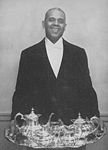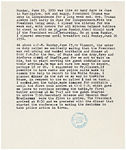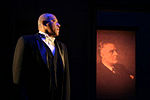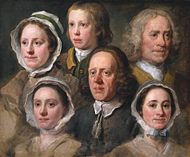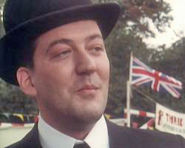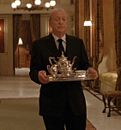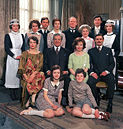Butler: Difference between revisions
imported>Stephen Ewen |
mNo edit summary |
||
| (446 intermediate revisions by 12 users not shown) | |||
| Line 1: | Line 1: | ||
{{Subpages}} | {{Subpages}} | ||
{{Image|White House Butlers Pantry - c2002.jpg|right|340px|A butler in the [[White House]] Butler's Pantry.}} | |||
A '''butler''' is a senior [[Servant (domestic)|servant]] in a well-to-do [[household]]. The position and its precursors have existed for centuries and have evolved over time. In the [[great house]]s of the past, the household was generally divided into areas of responsibility, with the butler in charge of the dining room, the [[wine cellar]], pantry, and sometimes the entire main floor, while a [[housekeeper]] was in charge of the house as a whole and its appearance.<ref name="emilypost">{{cite book | title=Emily Post's Etiquette| last=Post| first=Emily| date=2007| publisher=Echo Library| id=ISBN 1406812153}}</ref> <ref>Housekeepers are occasionally portrayed in literature as being the most senior staff member and even as making recommendations for the hiring of the butler. 18th-century housekeepers sometimes did earn extra money by giving tours of the great house, a fact depicted in Jane Austen's ''Pride and Prejudice''.</ref> In modern usage the butler is in charge of food service, wine, spirits, and [[silver (household)|silver]], supervises other servants, and may perform a wide array of household management duties. Butlers may also be titled ''Majordomo'', ''Butler Administrator'', ''Staff Manager'', and ''Head of Household Staff'', and in the grandest homes or when the employer owns more than one residence, there is sometimes an Estate Manager of higher rank than the butler. | |||
A '''butler''' is a senior [[Servant (domestic)|servant]] in a well-to-do [[household]]. The position | |||
In the [[great house]]s of the past, the household was generally divided into areas of responsibility, with the butler in charge of the dining room | |||
==Origin and development of the post of butler== | ==Origin and development of the post of butler== | ||
[[Image | {{Image|Pincerna-roman.jpg|left|95px|A slave in charge of wine in ancient Rome. The garb indicates he was probably of [[Phrygian]] origin.}} | ||
{{Image|Servants attending casks on their supports, 18th Egyptian Dynasty.jpg|right|250px|Servants attending to casks on supports, 18th Egyptian Dynasty, c. 1450 BC.}} | |||
The modern role of the butler has evolved from earlier roles that were generally concerned with the care and serving of alcoholic beverages. | The modern role of the butler has evolved from earlier roles that were generally concerned with the care and serving of alcoholic beverages. | ||
===Ancient | ===Ancient through medieval eras=== | ||
From ancient through medieval times, alcoholic beverages were chiefly stored first in earthenware vessels, then later in wooden barrels, rather than in glass bottles; these containers would have been an important part of a household's possessions. The care of these assets was therefore generally reserved for trusted slaves, although the job could also go to free persons because of heredity-based class lines or the inheritance of trades. | From ancient through medieval times, alcoholic beverages were chiefly stored first in earthenware vessels, then later in wooden barrels, rather than in glass bottles; these containers would have been an important part of a household's possessions. The care of these assets was therefore generally reserved for trusted slaves, although the job could also go to free persons because of heredity-based class lines or the inheritance of trades. | ||
The biblical book of [[Genesis]] contains a reference to a role precursive to modern butlers. The early Hebrew [[Joseph (Old Testament character)|Joseph]] interpreted a dream of Pharaoh's שקה (shaqah) (literally "to give to drink"), which is most often translated into English as "chief butler" or "chief cup-bearer".<ref>Genesis 39-40.</ref> | The biblical book of [[Genesis]] contains a reference to a role precursive to modern butlers. The early Hebrew [[Joseph (Old Testament character)|Joseph]] interpreted a dream of Pharaoh's שקה (shaqah) (literally "to give to drink"), which is most often translated into English as "chief butler" or "chief cup-bearer".<ref>Genesis 39-40.</ref> | ||
In ancient Greece and Rome, it was nearly always slaves who were charged with the care and service of wine, while during the | In ancient Greece and Rome, it was nearly always slaves who were charged with the care and service of wine, while during the [[Medieval Era]] the ''pincerna'', usually a [[serf]], filled the role within the noble court. | ||
The English word "butler" itself derives from the [[Middle English]] word ''boteler'' (and several other forms), from [[Old French]] ''bouteillier'' ("bottle bearer"), and before that from [[Middle Latin]] ''butticula''. "Butticula", in turn, came down to English as "butt" from the [[Latin]] ''buttis'', meaning a large cask. The modern [[English]] "butler" thus relates both to bottles and casks. | The English word "butler" itself derives from the [[Middle English]] word ''boteler'' (and several other forms), from [[Old French]] ''bouteillier'' ("bottle bearer"), and before that from [[Middle Latin]] ''butticula''. "Butticula", in turn, came down to English as "butt" from the [[Latin]] ''buttis'', meaning a large cask. The modern [[English]] "butler" thus relates both to bottles and casks. | ||
{{Image|Pincera-schenker.jpg|left|95px|A ''pincerna'' depicted in service to a noble court during the Medieval Era.}} | |||
Eventually the European butler emerged as a middle-ranking member of the servants of a great house, in charge of the ''buttery'' (originally a storeroom for "butts" of liquor, although the term later came to mean a general storeroom or pantry).<ref>This was most likely from a loss of the original Latin meaning and the mistaken belief that ''buttery'' related to "butter".</ref> While this is so for household butlers, those with the same title but in service to the Crown enjoyed a position of administrative power and were only minimally involved with various stores. | Eventually the European butler emerged as a middle-ranking member of the servants of a great house, in charge of the ''buttery'' (originally a storeroom for "butts" of liquor, although the term later came to mean a general storeroom or pantry).<ref>This was most likely from a loss of the original Latin meaning and the mistaken belief that ''buttery'' related to "butter".</ref> While this is so for household butlers, those with the same title but in service to the Crown enjoyed a position of administrative power and were only minimally involved with various stores. | ||
{{Image|Amesservants.jpg|right|250px|In a large house, the butler (centre-left) is traditionally head over a full array of household servants. This is the servant staff at the Stonehouse Hill of [[Massachusetts (U.S. state)|Massachusetts]], the estate of F. Lothrop Ames, 1914.}} | |||
=== | ===Elizabethan through Victorian eras=== | ||
The ''Steward'' of the Elizabethan era was more akin to the butler that later emerged.<ref>Lord Montague's Book of Rules and Orders, 1595.</ref> Gradually, throughout the nineteenth century and particularly the Victorian era, as the number of butlers and other domestic servants greatly increased in various countries (including America), the butler became a senior male servant of a household's staff. By this time he was in charge of the more modern ''wine cellar'', the "[[buttery]]" or ''pantry'' (from French ''pan'' from Latin ''panis'', bread) as it came to be called, which supplied bread, butter, cheese, and other basic provisions, and the ''ewery'', which contained napkins and basins for washing and shaving.<ref name="scanlon">{{cite journal | author=Nancy Scanlon| title=The Development of the Kitchen in the English Country House 1315-1864| journal=Journal of Culinary Science & Technology| year=2006| volume=4| issue=2/3| page=79-92}}</ref> In the very grandest households there was sometimes an Estate Steward or other senior steward who oversaw the butler and his duties.<ref name="mrsbeeton">{{cite book | title=Mrs Beeton's Book of Household Management| url=http://www.questia.com/PM.qst?a=o&d=89404824| last=Beeton| first=Isabella| date=1861) (2000| pages=393| publisher=Oxford University Press| id=ISBN 0192833456}}</ref> ''[[Mrs Beaton]]'s Book of Household Management'' (see [[Butler/External_Links#Links_to_full_text|link to full text]]), a manual published in Britain in 1861, reported: | |||
Gradually, throughout the nineteenth century and particularly the Victorian era, as the number of butlers and other domestic servants greatly increased in various countries (including America), the butler became a senior male servant of a household's staff. By this time he was in charge of the more modern ''wine cellar'', the "buttery" or ''pantry'' (from French ''pan'' from Latin ''panis'', bread) as it came to be called, which supplied bread, butter, cheese, and other basic provisions, and the ''ewery'', which contained napkins and basins for washing and shaving.<ref name="scanlon">{{cite journal | author=Nancy Scanlon| title=The Development of the Kitchen in the English Country House 1315-1864| journal=Journal of Culinary Science & Technology| year=2006| volume=4| issue=2/3| page=79-92}}</ref> In the very grandest households there was sometimes an Estate Steward or other senior steward who oversaw the butler and his duties.<ref name="mrsbeeton">{{cite book | title=Mrs Beeton's Book of Household Management| url=http://www.questia.com/PM.qst?a=o&d=89404824| last=Beeton| first=Isabella| date=1861) (2000| pages=393| publisher=Oxford University Press| id=ISBN 0192833456}}</ref> | |||
<BLOCKQUOTE> | <BLOCKQUOTE> | ||
''The number of the male domestics in a family varies according to the wealth and position of the master, from the owner of the ducal mansion, with a retinue of attendants, at the head of which is the chamberlain and house-steward, to the occupier of the humbler house, where a single footman, or even the odd man-of-all-work, is the only male retainer. The majority of gentlemen's establishments probably comprise a servant out of livery, or butler, a footman, and coachman, or coachman and groom, where the horses exceed two or three.''<ref>Beeton (1861), 393.</ref> | ''The number of the male domestics in a family varies according to the wealth and position of the master, from the owner of the ducal mansion, with a retinue of attendants, at the head of which is the chamberlain and house-steward, to the occupier of the humbler house, where a single footman, or even the odd man-of-all-work, is the only male retainer. The majority of gentlemen's establishments probably comprise a servant out of livery, or butler, a footman, and coachman, or coachman and groom, where the horses exceed two or three.''<ref>Beeton (1861), 393.</ref> | ||
</BLOCKQUOTE> | </BLOCKQUOTE> | ||
{| | {{Image|Glanusk park.gif|right|250px|Glanusk Park in Powys County, U.K., in 1891. The residence had 17 servants in residence. The largest stately houses could have 40 or more.}} | ||
| | Butlers were head of a strict service hierarchy and therein held a position of power and respect. They were more managerial than "hands on"—more so than serving, they officiated in service. For example, although the butler was at the door to greet and announce the arrival of a formal guest, the door was actually ''opened'' by a footman, who would receive the guest's hat and coat. Even though the butler helped his employer into his coat, this had been handed to him by a footman. However, even the highest-ranking butler would "pitch in" when necessary, such as during a staff shortage, to ensure that the household ran smoothly, although some evidence suggests this was so even during normal times.<ref>Carrolyn Steedman, "The servant’s labour: the business of life, England, 1760–1820", ''Social History'', Vol. 29 No. 1, (Feb., 2004).</ref> | ||
The household itself was generally divided into areas of responsibility. The butler was in charge of the dining room, the [[wine cellar]], pantry, and sometimes the entire main floor. Directly under the butler was the ''first footman'' (or ''head footman''), who was also ''deputy butler'' or ''under-butler'' that would fill in as butler during the butler's illness or absence. The ''[[footman]]''—there were frequently numerous young men in the role within a household—performed a range of duties including serving meals, attending doors, carrying or moving heavy items, and they often doubled as ''[[valets]]''. Valets themselves performed a variety of personal duties for their employer. Butlers engaged and directed all these junior staff and each reported directly to him. The ''[[housekeeper]]'' was in charge of the house as a whole and its appearance. In a household without an official head housekeeper, female servants and kitchen staff were also directly under the butler's management, while in smaller households, the butler usually doubled as valet. Employers and their children and guests addressed the butler by last name alone; fellow servants, retainers, and tradespersons as "Mr. [Surname]". | |||
Butlers were typically hired by the master of the house but usually reported to its lady. Beaton in her manual suggested a GBP 25 - 50 (USD 2,675 - 5,350) per-year salary for butlers; room and board and livery clothing were additional benefits, and tipping known as ''vails'', were common.<ref>D. Marshall, "The Domestic Servants of the Eighteenth Century", ''Economica'', No. 25, (Apr., 1929), pp. 15-40. [http://www.jstor.org/stable/2548516 Available online with subscription.]</ref> The few butlers who were married had to make separate housing arrangements for their families, as did all other servants within the hierarchy. | |||
===Butlers in early America=== | |||
{{Image|Robert Roberts The House Servant's Directory 1827 Book Cover.jpg|right|120px|Robert Roberts's ''The House Servant' Directory'', 1827.}} | |||
From the beginning of [[slavery]] in [[America]], in the early 1600s, [[African Americans]] were put to task as domestic servants. Some eventually became butlers. Gary Puckrein, a social historian, argues that those used in particularly affluent homes authentically internalised the sorts of "refined" norms and personal attributes that would reflect highly upon the social stature of their masters or mistresses. One of the first books written and published through a commercial U.S. publisher by an African American was by a butler named [[Robert Roberts]]. The book, ''The House Servant's Directory'' (see [[Butler/External_Links#Links_to_full_text|link to full text]]), first published in 1827, is essentially a manual for butlers and waiters, and is called by Puckrein "the most remarkable book by an African American in [[South:_Ante_Bellum|antebellum America]]". The book generated such interest that a second edition was published in 1828, and a third in 1843.<ref name="puckrein">{{cite journal | author=Gary Puckrein| title=The Science of Service| journal=American Visions| year=Oct/Nov 98| volume=13| issue=5}}</ref> | |||
European [[indentured servants]] formed a corps of domestic workers from which butlers were eventually drawn. Although not the victims of institutionalised slavery, many of these had not volunteered for domestic service, but were forced into it by indebtedness or coercion. As with African American slaves, they could rise in domestic service, and their happiness or misery depended greatly on the disposition of their masters. | |||
==The modern butler== | ===The modern butler=== | ||
Beginning around the early 1920s, employment in domestic service occupations began a sharp overall decline in western European countries, and even more markedly in the [[United States of America]]. Even so, there were still around thirty thousand butlers employed in the [[United Kingdom]] by [[World War II]]. As few as one-hundred were estimated to remain by the mid-1980s.<ref name="steadyjeevesyouvegotcompany">{{cite journal | author=J. Lee| title=Steady, Jeeves—you've got company!| journal=U.S. News & World Report| year=1988| volume=104| issue=17}}</ref> [[Social history|Social historian]] Barry Higman argues that a high number of domestic workers within a society correlates with a high level of socio-economic inequality. Conversely, as a society undergoes levelling among its [[social class]]es, the number employed in domestic service declines.<ref name="domesticserviceinaustralia">{{cite book | title=Domestic Service in Australia| last=Higman| first=Barry| date=2002| publisher=Melbourne University Publishing| id=ISBN 0522850111}}</ref> | |||
Following varied shifts and changes accompanying accelerated [[globalisation]] beginning in the late 1980s, overall global demand for butlers since the turn of the millennium has risen dramatically. According to Charles MacPherson, vice chairman of the International Guild of Professional Butlers, the proximate cause is that the number of millionaires and billionaires has increased in recent years, and such people are finding that they desire assistance in managing their households. MacPherson emphasises that the number of wealthy in China has particularly increased, creating in that country a high demand for professional butlers who have been trained in the European butlering tradition.<ref name="NPRradio">{{Cite web|url=http://www.npr.org/templates/story/story.php?storyId=7338550|title=By Jeeves, We're Having a Butler Shortage—Interview with Charles MacPherson|accessdate=2007-08-13|publisher=NPR News|year=10 Feb 2007|author=Scott Simon|work=Weekend Edition Saturday|format=Streaming Audio}} Also see Sheelah Kolhatka, [http://static.pinnaclecare.com/reprints/atlantic-monthly-09-06.pdf "Inside the Billionaire Service Industry"]. The Atlantic, Sept 2006, 97-101. [http://www.webcitation.org/5UUei8uRE Archived by WebCite®.]</ref> There is also increasing demand for such butlers in other [[Asia]]n countries, [[India]], and the [[petroleum]]-rich [[Middle East]].<ref>See for example Chadha, Monica. "Royal tips for Indian butlers", ''BBC News'', 17 Feb 2003. [http://news.bbc.co.uk/2/hi/south_asia/2761689.stm Available online.] [http://www.webcitation.org/5YERDpaXC Archived by WebCite®.]</ref> <ref>"Butlers: A Jeeves of my very own", ''The Daily Telegraph'', 15 Nov 2007. [http://www.telegraph.co.uk/portal/main.jhtml?xml=/portal/2007/11/15/ftbutler115.xml Available online.] [http://www.webcitation.org/5YF9YBJuE Archived by WebCite®.]</ref> | |||
[[ | |||
Higman additionally argues that the inequality/equality levels of societies are a major determinant of the nature of the domestic servant/employer relationship.<ref>Higman (2002).</ref> As the twenty-first century approached, many butlers began carrying out an increasing number of duties formerly reserved for more junior household servants. Butlers today may be called upon to do whatever household and personal duties their employers deem fitting, in the goal of freeing their employers to carry out their own personal and professional affairs. Professional butler and author Steven M. Ferry states that the image of tray-wielding butlers who specialise in serving tables and decanting wine is now anachronistic, and that employers may well be more interested in a butler who is capable of managing a full array of household affairs—from providing the traditional dinner service, to acting as valet, to managing high-tech systems and multiple homes with complexes of staff. Whilst in truly grand houses the modern butler may still function exclusively as a top-ranked household affairs manager,<ref name="butlersandhouseholdmanagers">{{cite book | title=Butlers & Household Managers: 21st Century Professionals| last=Ferry| first=Steven M| pages=14| publisher=BookSurge Publishing| id=ISBN 1591093066}}</ref> in lesser homes, such as those of dual-income middle-class professionals,<ref>"Butlers: A Jeeves of my very own", ''The Daily Telegraph'', 15 Nov 2007. [http://www.telegraph.co.uk/portal/main.jhtml?xml=/portal/2007/11/15/ftbutler115.xml Available online.] [http://www.webcitation.org/5YF9YBJuE Archived by WebCite®.]</ref> they perform a full array of household and [[personal assistant]] duties,<ref name="thebutlerdoesit">{{cite journal | author=William Loeffler| title=The butler does it| journal=The Pittsburgh Tribune-Review, Lifestyle| year=15 April 2007}}</ref> including mundane [[housekeeping]].<ref name="moveoverjeeves">{{cite journal | author=James Woodford| title=Move over, Jeeves, a new breed of butler is working her way up| journal=The Sydney Morning Herald| year=2007-08-13| url=http://www.smh.com.au/articles/2002/10/04/1033538773717.html}} [http://www.webcitation.org/5R4MfrgUq Archived by WebCite®.] Elizabeth Camille, a butler in Sydney, states, "I still make beds, clean toilets and peg out washing.... It's not all as glamorous as people perceive it to be." Additionally see "Desperately seeking Jeeves", The Globe and Mail (Canada), 20 July 2007. Lynda Reeves, president of the Toronto-based House & Home Media, says that the term "butler" today is just "a pretentious name for a housekeeper".</ref> Butlers today may also be situated within corporate settings, embassies, cruise ships, yachts, or within their own small "Rent-a-Butler" business or similar agency.<ref>Jones, Harvey. "More money than time? Rent a butler". ''The Independent'' (UK), 15 Dec 2001. Available [http://money.independent.co.uk/personal_finance/invest_save/article149002.ece online]. [http://www.webcitation.org/5TvdZjrhC Archived by WebCite®.] Also see http://www.rentabutler.de and http://www.rentabutler.nl/.</ref> | |||
Along with these changes of scope and context, butlering [[attire]] has changed. Whereas butlers have traditionally worn a special uniform that separated them from junior servants, and although this is still often the case, butlers today may adorn more casual clothing geared for climate, while exchanging it for formal business attire only upon special service occasions. There are cultural distinctivenesses, as well. In the United States, butlers may frequently adorn a polo short and slacks, while in Bali they typically wear [[sarong]]s.<ref>Patrao, Michael. "The alter ago of Jeeves". ''The Deccan Herald'', 27 July 2007. Available [http://www.deccanherald.com/Content/Jul272007/metro2007072615305.asp online]. [http://www.webcitation.org/5Tvf9PxTe Archived by WebCite®.]</ref> | |||
In | In 2007, the number of butlers in the United Kingdom had risen to an estimated 5,000.<ref>Sapstead, David. "Shortage of Butlers Has World's Wealthy Facing a Crisis", ''New York Sun'', 30 May 2007. [http://www.nysun.com/foreign/shortage-of-butlers-has-worlds-wealthy-facing/55511/ Available online.] [http://www.webcitation.org/5YDkDOzGn Archived by WebCite®.]</ref> | ||
<center> | |||
{{Gallery-mixed | |||
|caption= | |||
|width=150 | |||
|lines=4 | |||
|Magnums_Butlers_May_2006.jpg|Butlering after the British prototype has dispersed widely. Depicted here is a butler in Singapore. | |||
|Magnums Butlers - A Butler in Australia Serving on a Yacht.JPG|A butler serving on a private yacht in Australia. | |||
|Cruise ship butler.jpg|A butler serving vacationers aboard the cruise ship Queen Victoria. | |||
|Corporate Butler - Sebastian Hirsch.jpg|A "rent-a-butler" in a corporate setting. | |||
|Butler Hotel Monasterio Peru.jpg|A hotel butler drawing a custom bath at Hotel Monasterio, Peru. | |||
|Butler serving drink in Bali.jpg|A hotel butler serving drink in Bali. Note his sarong garb. | |||
|Butler Rick Fink.jpg|A butler (Rick Fink) folding a shirt. | |||
|White House butlers 2006-03-23.jpg|White House butlers place the finishing touches on table settings and decorations, Thursday evening, March 23, 2006 in the Blue Room of the White House, for a Social Dinner hosted by President George W. Bush and Mrs. Laura Bush in honor of the 300th Birthday of Benjamin Franklin.}} | |||
</center> | |||
===Gender and butlering=== | ===Gender and butlering=== | ||
Butlers have traditionally been male, and this remains the norm. Probably the first mention of a female butler is in the 1892 book ''Interludes being Two Essays, a Story, and Some Verses'' by Horace Smith (see link to full text | [[Image:Elizabeth Camille by Peter Rae.jpg|right|thumb|150px|{{#ifexist:Template:Elizabeth Camille by Peter Rae.jpg/credit|{{Elizabeth Camille by Peter Rae.jpg/credit}}<br/>|}}A female butler in Australia.<ref name="moveoverjeeves2">{{cite journal | author=James Woodford| title=Move over, Jeeves, a new breed of butler is working her way up| journal=The Sydney Morning Herald| year=2007-08-13| url=http://www.smh.com.au/articles/2002/10/04/1033538773717.html}} [http://www.webcitation.org/5R4MfrgUq Archived by WebCite®.]</ref>]] | ||
Butlers have traditionally been male, and this remains the norm. Probably the first mention of a female butler is in the 1892 book ''Interludes being Two Essays, a Story, and Some Verses'' by Horace Smith (see [[Butler/External_Links#Links_to_full_text|link to full text]]). In it Smith quotes a certain Sydney Smith who had apparently run into lean times: | |||
<blockquote> | <blockquote> | ||
''A man servant was too expensive, so I caught up a little garden girl, made like a milestone, christened her Bunch, put a napkin in her hand, and made her my butler. The girls taught her to read, Mrs. Sydney to wait, and I undertook her morals. Bunch became the best butler in the country''.<ref | ''A man servant was too expensive, so I caught up a little garden girl, made like a milestone, christened her Bunch, put a napkin in her hand, and made her my butler. The girls taught her to read, Mrs. Sydney to wait, and I undertook her morals. Bunch became the best butler in the country''.<ref>Smith, Horace; Joel Lehtonen (translator) (1892). ''Interludes being Two Essays, a Story, and Some Verses''. MacMillan & Co. ISBN 1406919659. Available [http://infomotions.com/etexts/gutenberg/dirs/1/7/0/6/17065/17065.htm online] (full text). [http://www.webcitation.org/5UUf9ithw Archived by WebCite®.]</ref> | ||
</blockquote> | </blockquote> | ||
Today, female butlers are sometimes preferred,<ref name="moveoverjeeves2">{{cite journal | author=James Woodford| title=Move over, Jeeves, a new breed of butler is working her way up| journal=The Sydney Morning Herald| year=2007-08-13| url=http://www.smh.com.au/articles/2002/10/04/1033538773717.html}} [http://www.webcitation.org/5R4MfrgUq Archived by WebCite®.]</ref> especially for work within Middle and Far Eastern families where it may be culturally problematic for males to work closely with females in a household.<ref>See "Unique Rosewood Ladies Floor could start trend in Saudi, Middle East Hotels", 12 Oct 2007. [http://www.automobilsport.com/hotels-resorts-rosewood-saudi-middle-east-corniche-jeddah-saudiarabia-hans-peter-leitzke-photos---30962.html Available online.] [http://www.webcitation.org/5YDRTYNMo Archived by WebCite®.] Also, for interesting background see Elizabeth Warnock Fernea, ''Guests of the Sheik: An Ethnography of an Iraqi Village''. Anchor, 1995. ISBN 0385014856.</ref> Western female celebrities may also prefer a female butler,<ref>See [http://www.butlersguild.com The International Guild of Professional Butlers], accessed 12/31/2007. [http://www.webcitation.org/5UUgSKDTO Archived by WebCite®.]</ref> as may households where the wife is driving the decision to hire a butler,<ref>"Butlers: A Jeeves of my very own", ''The Daily Telegraph'', 15 Nov 2007. [http://www.telegraph.co.uk/portal/main.jhtml?xml=/portal/2007/11/15/ftbutler115.xml Available online.] [http://www.webcitation.org/5YF9YBJuE Archived by WebCite®.]</ref> and in 2004 [[Buckingham Palace]] announced it was actively recruiting females for the position.<ref>Milne, Meg. "The Royal butlerettes", ''The Financial Mail'', 31 Oct 2004. [http://www.fmwf.com/newsarticle.php?id=338&cat=6 Available online.] [http://www.webcitation.org/5YDPEIPvR Archived by WebCite®.]</ref> Despite these trends, the Ivor Spencer School asserts that female butlers are not easily placed, on the whole. | |||
In ancient times, the roles precursive to butlering were reserved for chattel or those confined within heredity-based class structures. With the advent of the medieval era, butlering became an opportunity for social advancement—even more so during Victorian times. Although still based upon various antecedent roles as manifested during different eras, butlering today has frequently taken over many of the roles formerly reserved for lower ranking domestic servants. At the same time it has become a potentially lucrative career option.<ref>In Loeffler (15 April 2007), Nathalie Laitmon of The Calendar Group in Stamford, Connecticut, states that skilled butlers within the grandest households can make USD 200,000 (GBP 101,500). She states, "The bigger the lifestyle of the family, the more they can earn".</ref> | |||
==Butler training== | ==Butler training== | ||
Butlers traditionally learned their position while progressing their way up the service ladder. For example, in the documentary ''The Authenticity of Gosford Park'', retired butler Arthur Inch (born 1915) describes starting as a [[hall boy]].<ref>''The Authenticity of Gosford Park'', Documentary featurette in ''Gosford Park'' Collector's Edition DVD, Universal Studios, 2002.</ref> Whilst this is still often the case, numerous private butlering schools exist today; top graduates can start at USD 50,000 - 60,000 (GBP 25,350 - 30,400).<ref>Simon (10 Feb 2007).</ref> Additionally, major up-market hotels such as the [[Ritz-Carlton]] offer traditional butler training, while some hotels have trained a sort of pseudo-butler for service in defined areas such as "technology butlers", who fix guests' computers and other electronic devices, and "bath butlers" who draw custom baths.<ref name="thebutlersaredoingit">{{cite journal | author=Witchel| title=At Hotels, the Butlers Are Doing It| journal=New York Times| year=2000| volume=149| issue=51486| page=2}} Ferry, as quoted in "Desperately seeking Jeeves", The Globe and Mail (Canada), 20 July 2007, was quoted as saying that hotel butlers are not rooted in the European tradition of butlering. He states that some hotels essentially rename their pool attendants as "pool butlers" and this is not a real butler so much as a marketing gimmick.</ref> <ref>Rouvalis, Cristina. "Butler provides the perfect pampering", ''Pittsburgh Post-Gazette'', 06 May 2007. [http://www.post-gazette.com/pg/07126/783166-37.stm Available online.] [http://www.webcitation.org/5YDQvRyvh Archived by WebCite®.]</ref> <ref>Hotels are rated by the International Institute of Modern Butlers according to their butler service offerings, which can range from the one-on-one personalized butler (a 5-Butler rating) to the "pool butler (a 0-Butler rating). See http://www.modernbutlers.com/html/butler-rating-system.html</ref> | |||
Starkey International distinguishes between the "British butler" prototype and its American counterpart, often dubbed the "household manager". Starkey states that they train and promote the latter, believing that Americans do not have the "servant mentality" that is part of the British Butler tradition. They stress that their American-style butlers and valets are educated and certified,<ref>Starkey does lay claim to understanding the British butler tradition; however, her general approach seems to be that American domestic staff are better suited to American families.</ref> although some students, numerous former Starkey employees, and several wealthy clients have criticised the programme and its owner.<ref name="starkeycontroversy">{{cite journal | author=Joel Warner| title=At Your Disservice| journal=Denver Westword News| year=9 Aug 2007| url=http://www.westword.com/2007-08-09/news/at-your-disservice}} [http://www.webcitation.org/5R5vB2Vfu Archived by WebCite®.]</ref> Magnums Butlers, a school based in Australia, conducts training after the British model at sites in Asia and the Pacific, Australia, the United Kingdom and the Middle East.<ref>See [http://www.magnumsbutlers.com Magnums Butlers], accessed 12/31/2007. [http://www.webcitation.org/5UUgjKPZP Archived by WebCite®.]</ref> The International Institute of Modern Butlers provides on-site training in various places around the world as well as via correspondence. In 2007, [[City & Guilds]], the U.K.'s largest awarder of vocational credentials, introduced a diploma programme for butlers.<ref>See http://www.cityandguilds.com/cps/rde/xchg/SID-7D78108B-8F23F7DA/cgonline/hs.xsl/12341.html</ref> The International Institute of Modern Butlers also provides on-site training of individual butlers. | |||
In addition to formal training, a few books have been published recently to assist butlers in their duties, including [[Arthur Inch]]'s and Arlene Hirst's 2003 ''Dinner is Served'' as well as Ferry's "Butlers and Household Managers, 21st Century Professionals." Moreover, websites, as well as a news publication, ''Modern Butlers' Journal'', help butlers to network and keep abreast of developments within their field. | |||
Ferry argues that what he calls a "butler mindset" is beneficial to all people within all professions. He states that an attitude of devoted service to others, deference, and the keeping of confidences can help all people succeed. | |||
<center> | |||
{{Gallery-mixed | |||
|caption= | |||
|width=150 | |||
|lines=4 | |||
|Magnums Butlers July 2007 - Butler Training in Dubai.jpg|Hotel Butlers-in-training, [[Dubai]]. | |||
|Rick Fink - butler-valet school 2.jpg|Butler Rick Fink (left), who runs a private butler valet school in Winston Churchill's former weekend mansion, demonstrates to two students the correct procedures for packing a suitcase.<ref>Binham, Caroline, "More Butlers Do It as London Embraces Incomes With Eight Digits", ''Bloomberg News'', 8 April 2008. [http://www.bloomberg.com/apps/news?pid=20601085&sid=aceQtvBwh7t0# Available online] [http://www.webcitation.org/5YI8HqZPG Archived by WebCite®.] Also see Fink's [http://www.butler-valetschool.co.uk/ Butler Valet School], and the [http://www.ditchley.co.uk/ The Ditchley Foundation] who owns Ditchley Park, Churchill's former weekend mansion.</ref> | |||
|Richard McIntosh, Paul Mrus and Jeff Murray during their butler training at the Rosewood hotel.jpg|Hotel butlers-in-training arranging robes to lay over a bed.}} | |||
</center> | |||
==Historically important butlers== | |||
By nature of their position and its requisite staunch discretion, it is exceptional when a butler achieves historical importance. One butler who did is [[Alonzo Fields]] (1900-1994), who served as a [[White House]] butler for twenty-one years, all but his first year as chief butler, under presidents Hoover, Roosevelt, Truman, and Eisenhower. After his retirement Fields in 1960 published ''My 21 Years in the White House'' in which he weaved together his private papers and cryptically-written journals, written while serving, with his recollections. Although restrained, his memoir nonetheless provides a uniquely intimate [[primary source]] account of the U.S. presidents he served, several who came to trust Fields as a close personal friend. Fields reports, for example, that he was present when Roosevelt was first informed of the Japanese bombing of [[Pearl Harbor]] and that Roosevelt "broke down completely" during that moment, and also emoted racial slurs against the Japanese before gaining control. Truman was especially close with Fields and even related with him as an emotional confidant at times, and the two at one point sat together for a portrait. | |||
When Fields began his tenure at the White House, senators from the [[U.S. South]] frequently addressed him with the racially condescending term "boy", and an obvious racial hierarchy existed between white and black White House house staff, with whites dominating. Whilst the attitudes of most southern U.S. senators would not begin to change until the advent of [[U.S. Civil Rights Movement]], Roosevelt took it upon himself to remove racial tensions among the house staff by making it all black.<ref>Fields, Alonzo. ''My 21 years in the White House'', New York: Coward-McCann, 1960.</ref> <ref>Sam Stiegler, "When Speaking About Me, 'Don’t Talk too Long and Don’t Tell the Truth': A Biography of Mr. Alonzo Fields (1900-1994), West Medford Afro-American Remembrance Project, 2005. [http://www.medfordhistorical.org/pdfs/alonzofieldsbio.pdf Available online.] [http://www.webcitation.org/5Y7YHouki Archived by WebCite®.]</ref> <ref>''U.S. News & World Report'', "Alonzo Fields diary, Truman's butler", 16 July 2007. [http://www.usnews.com/usnews/news/articles/060716/16alonzofields_eye.htm Available online.] [http://www.webcitation.org/5YD3pH8kF Archived by WebCite®.]</ref> | |||
More than a decade after Fields's death in 1994, his story was cast into a one-man theatrical performance, ''Looking Over the President's Shoulder.''<ref>Burlingham Ellis, Caroline. "Review of 'Looking Over the President's Shoulder'", ''Theatre Mania'', 8 Dec 2003. [http://www.theatermania.com/content/news.cfm/story/4174 Available online.] [http://www.webcitation.org/5YDM3a6ao Archived by WebCite®.]</ref> <ref>Bales-Sherrod, Lesli. "Serving up a slice of history", ''The American Observer'', Vol. 9, No. 3, 24 Feb 2004. [http://observer.american.edu/2004/feb2504/review.html Available online.] [http://www.webcitation.org/5YDMcdYov Archived by WebCite®.]</ref> Historians, such as [[David McCullough]] in his 2003 biography ''Truman'', continue to consult Fields's memoirs when constructing accounts of the presidents he served.<ref>McCullough, David. ''Truman'', Simon & Schuster, pp 472, 473, 502, 623, 931. ISBN 0-7432-6029-5.</ref> | |||
<center> | |||
{{Gallery-mixed | |||
|caption= | |||
|width=150 | |||
|lines=4 | |||
|Alonzo Fields - White House Butler.jpg|Alonzo Fields | |||
|Alonzo Fields - Truman Notes.jpg|Page from Alonzo Fields's personal papers. This one describes his conduction of a service-event that resulted in Truman's decision to enter the Korean War. | |||
|Alonzo Fields - My 21 Years in the White House.jpg|1961 edition of Fields's ''My 21 Years in the White House.'' | |||
|Looking over the President's Shoulder.jpg|James Still playing Fields in the theatrical ''Looking Over The President's Shoulder''. | |||
}} | |||
</center> | |||
Butlers | ==Butlers in visual art== | ||
{{Image|720px-William Hogarth 010.jpg|right|190px|''Heads of Six of Hogarth's Servants.''}} | |||
Butlers have been occasionally depicted in visual art. A famous [[painting]], ''Heads of Six of Hogarth's Servants'' (c. 1758), is unique among such works. In it, the 17th-century English artist [[William Hogarth]] depicted his household servants, each surrounding the butler. In showing the group in a close-knit assemblage rather than in the performance of their routine household duties, Hogarth sought to humanise and dignify them in a manner akin to wealthy-class members, who were the normal subjects of such [[Portraits (art)|portraits]]. Whilst this was a subversive act that certainly raised many eyebrows in his day—Hogarth conspicuously displayed the work in his estate home in full view of guests—at the same time he had painted his servants' facial expressions to convey the sincerity and deference expected of servant-class members.<ref name="fourhundredyears">{{cite book | title=Below stairs, 400 years of servants' portraits| last=Waterfield G., A. French and M. Craske, Eds.| date=2003| publisher=National Portrait Gallery| location=London| id=ISBN 185514512X}}</ref> | |||
In [[contemporary art]], "The Butler's in Love" series by U.S. artist [[Mark Stock]] is especially poignant. In the series, Stock portrays the butler as sick with love, but the possibility of fulfillment is hopeless: the love is a forbidden love, perhaps felt for the lady of the house, and so it must be suffered alone in silent hiddenness. In addition to the ongoing mannerisms and facial expressions of the butler, a seated lady once-appearing in a curtained room and a recurring lipstick-stained [[absinthe]] glass over which the butler obsesses provide the interpretive clues. In selecting a butler as his subject, Stock sought to provide a "universal character", a pathos-laden figuration that could be widely related to and that could depict the universality of loneliness felt by someone who can only look in from the outside. Stock began the series in 1985 to express his difficult feelings during a personal experience of unrequited love. One of the paintings was inspiration for a [[3-D]] short film, "The Butler's in Love" by actor/director [[David Arquette]], shot in 2008 at [[San Francisco, California]]'s historic [[Westerfield Mansion]].<ref>Croft, Karen. "Butlers in Love", ''Salon'', 24 May 2001. Available online: [http://dir.salon.com/story/sex/feature/2001/05/24/stock/ Page 1], [http://dir.salon.com/story/sex/feature/2001/05/24/stock/index1.html Page 2], [http://www.webcitation.org/5YDF2PTVk Archive 1], [http://www.webcitation.org/5YDF3heL9 Archive 2].</ref> <ref>Stock, Mark. Correspondence with Stephen Ewen, stephenewen.org. Also see http://www.theworldofmarkstock.com.</ref> <ref>Garchik, Leah. ''San Francisco Chronicle'', 14 May 2008. [http://www.sfgate.com/cgi-bin/article.cgi?f=/c/a/2008/05/14/DDOF10KL7M.DTL& Available online.] [http://www.webcitation.org/5YDbUZBtX Archived by WebCite®.] Also see http://www.wayfaring.com/waypts/show/32050 for a brief history of the mansion.</ref> | |||
<center> | |||
{{gallery | |||
|caption = Examples from "The Butler's in Love" series | |||
|width = 120 | |||
|lines = 0 | |||
|licence = C | |||
|author = Mark Stock | |||
|Butler's_in_love_6.JPG| | |||
|Butler's_in_love_16_-_1991.JPG| | |||
|Stock_bixbutlglass_b5.jpg| | |||
|The_Butlers_in_Love_3.jpg| | |||
|The_Butlers_in_Love_4.jpg| | |||
}} | |||
</center> | |||
==The butler in " | ==Fictional butlers== | ||
{{Image|Jeeves.jpg|left|185px|Reginald Jeeves as portrayed by Stephen Fry in [[ITV]]'s ''[[Jeeves and Wooster]]'' series.}} | |||
The real-life modern butler attempts to be discreet and unobtrusive, friendly but not familiar, keenly anticipative of the needs of his or her employer, and graceful and precise in execution of duty. "The butler" in fiction, by contrast, is typically larger-than-life and has become a traditional plot device in various literature, film and theatre. In potboilers and melodramas, butlers provide comic relief with wry comments, or clues about the perpetrators of various crimes, and are represented as being at least as intelligent, and often more so, than their "betters". Butlers figure so prominently in period pieces and whodunits that the catch phrase "The butler did it!" has become commonplace. Regardless of the genre in which they are cast, butlers in fiction almost invariably follow the "British butler" model and are given an appropriate-sounding surname. The Asian, African American, or Caribbean houseboy is a variant, but even these major-domos are based on the British icon. The best-known fictional manservant, and the prototype of the quintessential British butler, is himself not a butler at all. [[Jeeves|Reginald Jeeves]], the iconic creation of author [[P.G. Wodehouse]] is a "gentleman's gentleman" and general [[factotum]]. Probably the best-known fictional butlers are [[Alfred Pennyworth|Alfred]] from the ''[[Batman]]'' comic and films; Hudson of [[Upstairs, Downstairs]] television fame; and, Crichton from [[J.M. Barrie]]'s ''[[The Admirable Crichton]]''. Lesser-knowns include Mr. Belvedere from the novel ''[[Belevedere (novel)|Belvedere]]'', which was adapted into a feature film with sequels and later a [[television series]]; Lurch, from the television series {{Image|Ask Jeeves - Ask dot com.jpg|right|200px|Ask Jeeves, a search engine superseded by Ask.com.}}''[[The Addams Family]]'', based on Charles Addams' ''[[New Yorker]]'' cartoons; Beach, from the Wodehouse series about [[Blandings Castle]]; and, Benson from the two series ''[[Soap (TV series)|Soap]]'' and ''[[Benson (television)|Benson]]''. | |||
{{Image|New Ask Jeeves 2009.JPG|left|165px|Ask Jeeves in 2009.}} | |||
Playing off Wodehouse's Jeeves character, computer scientist David Warthen in 1996 founded a [[search engine]], "Ask Jeeves" (AskJeeves.com), which became the fourth-most-used among such sites. Greeted with a cartoon depiction of Jeeves, information-seekers followed a simple analogy when searching with the site: when asked questions in natural language, the ever-ready Jeeves would snappily fetch answers from the [[World Wide Web]] and serve them up with a pleased smile. After Wodehouse's estate threatened legal action against Ask Jeeves for copyright infringement, the search engine settled in 2006, humorously announced that Jeeves had retired, and renamed itself [[Ask.com]].<ref>Buresh, Scott. "Ask.com Search Engine - A Brief History", 1 May 2008. [http://www.webpronews.com/expertarticles/2008/04/11/askcom-search-engine-a-brief-history Available online.] [http://www.webcitation.org/5YD3vv8KD Archived by WebCite®.] Also see http://blog.ask.com/2006/02/thanks_jeeves.html and http://sp.ask.com/en/docs/about/jeeveshasretired.html. Ask.com stated, "Jeeves is taking a much deserved break and cruising around the world in blissful retirement, aboard his luxury cruise liner."</ref> In April 2009, the company suddenly reintroduced a trendier-appearing Jeeves to only the U.K.<ref>Sweney, Mark. "Ask Jeeves search engine revived", 20 April 2009. [http://www.guardian.co.uk/media/2009/apr/20/ask-jeeves-search-engine-revived Available online.], [http://www.webcitation.org/5gB227v4s Archived by WebCite®.]</ref> | |||
Not all fictional butlers portray the "butler stereotype", however. [[Alan Bates]], who played the butler Jennings in the film ''[[Gosford Park]]'', was coached in brooding detail by Arthur Inch, a longtime real-life butler.<ref>"The man who got it right for Gosford Park and told Richard E Grant what was wrong", ''Mid Sussex Times'', 2002. [http://www.midsussextimes.co.uk/CustomPages/CustomPage.aspx?PageID=35023 Available online.] [http://www.webcitation.org/5YF2KEI9A Archived by WebCite®.] Also see ''The Authenticity of Gosford Park''.</ref> Mr. Stevens, the butler played by [[Anthony Hopkins]] in the film ''[[Remains of the Day]]'', was also acted with remarkable realism. A female butler, Sarah Stevens, is the principle character in [[Linda Howard]]'s 2002 ''Dying to Please'', a murder/romance novel. Howard gives detailed and generally accurate descriptions of butlering in the work.<ref>For a synopsis of Howard's book, see http://www1.epinions.com/content_64617352836.</ref> | |||
[[ | <center> | ||
{{Gallery-mixed | |||
|caption= | |||
|width=130 | |||
|lines=5 | |||
|Lurch, Addams Family.jpg|'''Lurch''' ([[Ted Cassidy]]) in the television series ''The Addams Family'' | |||
|Michael Caine as Alfred Pennyworth.jpg|'''Alfred''' ([[Michael Caine]]) in the 2005 film ''[[Batman Begins]]''. | |||
|Benson tv.jpg|'''Benson''' ([[Robert Guillaume]]) (first on left) in the television series ''Benson''. | |||
|Hudson of Upstairs, Downstairs.jpg|'''Hudson''' ([[Gordon Jackson]]) (fifth from left, top) in the television series ''Upstairs, Downstairs''. | |||
|Anthony Hopkins Remains of the Day.jpg|'''Mr. Stevens''' (Anthony Hopkins) interviews Miss Kenton ([[Emma Thompson]]) for the position of [[housekeeper]] in the film ''Remains of the Day''. | |||
}} | |||
</center> | |||
==Butler as a surname== | |||
"Butler" as a surname stems from a famous and arguably the most powerful family that arose in Ireland beginning in the later part of the twelfth century. In 1185, the Butler family ancestor, Theobald Walter, accompanied [[King John]] to Ireland to help secure [[Norman invasion of Ireland|Norman areas]]. When men Walter led killed Dermot MacCarthy, prince of [[Desmond]], [[King John]] granted Walter large areas of strategic land and an important [[fief]], on which Walter both founded an [[abbey]] and established his Irish seat. Upon returning to England, King John endowed Walter with the hereditary office "Butler to the Lord of Ireland"; some evidence indicates that he was also dubbed "Butler of Ireland". The surname Butler thus developed. Walter's grandson was [[James Butler]], 1st Duke Of Ormonde.<ref>"Butler", ''Encyclopædia Britannica'', 1911 edition. [http://www.1911encyclopedia.org/Butler Available online.] Also see The Carey Estate BCM/H [n.d.], Berkeley Castle Muniments, U.K. National Archives, [http://www.nationalarchives.gov.uk/a2a/records.aspx?cat=2189-bcm_4&cid=4&kw=butlers#4 available online.] [http://www.webcitation.org/5YFtztuwb Archived by WebCite®.]; [http://www.nationalarchives.gov.uk/a2a/records.aspx?cat=109-mss_1-1_4&cid=6-27&kw=Theobald%20Walter#6-27 National Archive Record MS 613, f. 21]; [http://www.nationalarchives.gov.uk/a2a/records.aspx?cat=109-mss_1-1_4&cid=6-35&kw=Theobald%20Walter#6-35 National Archive Record MS 613, f. 30].</ref> | |||
The American mystery writer [[John Dickson Carr]], who lived in England for many years and most of whose books were situated there, wrote one highly acclaimed [[Dr. Gideon Fell]] novel in which a London barrister named Patrick Butler was a leading character, and followed that some years later with a novel ''[[Patrick Butler for the Defense]]''. | |||
==References== | ==References== | ||
< | {{reflist}} | ||
<br /> | |||
---- | |||
::''This article is derived principally from "A Brief History of Butlers and Buttling" by Stephen Ewen, available at [http://stephenewen.org/articles/History_of_Butlers_and_Butlering.html http://stephenewen.org/articles/History_of_Butlers_and_Butlering.html], which is licensed under the [http://creativecommons.org/licenses/by-sa/3.0/ Creative Common Attribution-Share Alike 3.0 Unported] and later.'' | |||
----[[Category:Suggestion Bot Tag]] | |||
Latest revision as of 11:00, 22 July 2024
A butler is a senior servant in a well-to-do household. The position and its precursors have existed for centuries and have evolved over time. In the great houses of the past, the household was generally divided into areas of responsibility, with the butler in charge of the dining room, the wine cellar, pantry, and sometimes the entire main floor, while a housekeeper was in charge of the house as a whole and its appearance.[1] [2] In modern usage the butler is in charge of food service, wine, spirits, and silver, supervises other servants, and may perform a wide array of household management duties. Butlers may also be titled Majordomo, Butler Administrator, Staff Manager, and Head of Household Staff, and in the grandest homes or when the employer owns more than one residence, there is sometimes an Estate Manager of higher rank than the butler.
Origin and development of the post of butler

A slave in charge of wine in ancient Rome. The garb indicates he was probably of Phrygian origin.
The modern role of the butler has evolved from earlier roles that were generally concerned with the care and serving of alcoholic beverages.
Ancient through medieval eras
From ancient through medieval times, alcoholic beverages were chiefly stored first in earthenware vessels, then later in wooden barrels, rather than in glass bottles; these containers would have been an important part of a household's possessions. The care of these assets was therefore generally reserved for trusted slaves, although the job could also go to free persons because of heredity-based class lines or the inheritance of trades.
The biblical book of Genesis contains a reference to a role precursive to modern butlers. The early Hebrew Joseph interpreted a dream of Pharaoh's שקה (shaqah) (literally "to give to drink"), which is most often translated into English as "chief butler" or "chief cup-bearer".[3]
In ancient Greece and Rome, it was nearly always slaves who were charged with the care and service of wine, while during the Medieval Era the pincerna, usually a serf, filled the role within the noble court. The English word "butler" itself derives from the Middle English word boteler (and several other forms), from Old French bouteillier ("bottle bearer"), and before that from Middle Latin butticula. "Butticula", in turn, came down to English as "butt" from the Latin buttis, meaning a large cask. The modern English "butler" thus relates both to bottles and casks.
Eventually the European butler emerged as a middle-ranking member of the servants of a great house, in charge of the buttery (originally a storeroom for "butts" of liquor, although the term later came to mean a general storeroom or pantry).[4] While this is so for household butlers, those with the same title but in service to the Crown enjoyed a position of administrative power and were only minimally involved with various stores.

In a large house, the butler (centre-left) is traditionally head over a full array of household servants. This is the servant staff at the Stonehouse Hill of Massachusetts, the estate of F. Lothrop Ames, 1914.
Elizabethan through Victorian eras
The Steward of the Elizabethan era was more akin to the butler that later emerged.[5] Gradually, throughout the nineteenth century and particularly the Victorian era, as the number of butlers and other domestic servants greatly increased in various countries (including America), the butler became a senior male servant of a household's staff. By this time he was in charge of the more modern wine cellar, the "buttery" or pantry (from French pan from Latin panis, bread) as it came to be called, which supplied bread, butter, cheese, and other basic provisions, and the ewery, which contained napkins and basins for washing and shaving.[6] In the very grandest households there was sometimes an Estate Steward or other senior steward who oversaw the butler and his duties.[7] Mrs Beaton's Book of Household Management (see link to full text), a manual published in Britain in 1861, reported:
The number of the male domestics in a family varies according to the wealth and position of the master, from the owner of the ducal mansion, with a retinue of attendants, at the head of which is the chamberlain and house-steward, to the occupier of the humbler house, where a single footman, or even the odd man-of-all-work, is the only male retainer. The majority of gentlemen's establishments probably comprise a servant out of livery, or butler, a footman, and coachman, or coachman and groom, where the horses exceed two or three.[8]
Butlers were head of a strict service hierarchy and therein held a position of power and respect. They were more managerial than "hands on"—more so than serving, they officiated in service. For example, although the butler was at the door to greet and announce the arrival of a formal guest, the door was actually opened by a footman, who would receive the guest's hat and coat. Even though the butler helped his employer into his coat, this had been handed to him by a footman. However, even the highest-ranking butler would "pitch in" when necessary, such as during a staff shortage, to ensure that the household ran smoothly, although some evidence suggests this was so even during normal times.[9]
The household itself was generally divided into areas of responsibility. The butler was in charge of the dining room, the wine cellar, pantry, and sometimes the entire main floor. Directly under the butler was the first footman (or head footman), who was also deputy butler or under-butler that would fill in as butler during the butler's illness or absence. The footman—there were frequently numerous young men in the role within a household—performed a range of duties including serving meals, attending doors, carrying or moving heavy items, and they often doubled as valets. Valets themselves performed a variety of personal duties for their employer. Butlers engaged and directed all these junior staff and each reported directly to him. The housekeeper was in charge of the house as a whole and its appearance. In a household without an official head housekeeper, female servants and kitchen staff were also directly under the butler's management, while in smaller households, the butler usually doubled as valet. Employers and their children and guests addressed the butler by last name alone; fellow servants, retainers, and tradespersons as "Mr. [Surname]".
Butlers were typically hired by the master of the house but usually reported to its lady. Beaton in her manual suggested a GBP 25 - 50 (USD 2,675 - 5,350) per-year salary for butlers; room and board and livery clothing were additional benefits, and tipping known as vails, were common.[10] The few butlers who were married had to make separate housing arrangements for their families, as did all other servants within the hierarchy.
Butlers in early America
From the beginning of slavery in America, in the early 1600s, African Americans were put to task as domestic servants. Some eventually became butlers. Gary Puckrein, a social historian, argues that those used in particularly affluent homes authentically internalised the sorts of "refined" norms and personal attributes that would reflect highly upon the social stature of their masters or mistresses. One of the first books written and published through a commercial U.S. publisher by an African American was by a butler named Robert Roberts. The book, The House Servant's Directory (see link to full text), first published in 1827, is essentially a manual for butlers and waiters, and is called by Puckrein "the most remarkable book by an African American in antebellum America". The book generated such interest that a second edition was published in 1828, and a third in 1843.[11]
European indentured servants formed a corps of domestic workers from which butlers were eventually drawn. Although not the victims of institutionalised slavery, many of these had not volunteered for domestic service, but were forced into it by indebtedness or coercion. As with African American slaves, they could rise in domestic service, and their happiness or misery depended greatly on the disposition of their masters.
The modern butler
Beginning around the early 1920s, employment in domestic service occupations began a sharp overall decline in western European countries, and even more markedly in the United States of America. Even so, there were still around thirty thousand butlers employed in the United Kingdom by World War II. As few as one-hundred were estimated to remain by the mid-1980s.[12] Social historian Barry Higman argues that a high number of domestic workers within a society correlates with a high level of socio-economic inequality. Conversely, as a society undergoes levelling among its social classes, the number employed in domestic service declines.[13]
Following varied shifts and changes accompanying accelerated globalisation beginning in the late 1980s, overall global demand for butlers since the turn of the millennium has risen dramatically. According to Charles MacPherson, vice chairman of the International Guild of Professional Butlers, the proximate cause is that the number of millionaires and billionaires has increased in recent years, and such people are finding that they desire assistance in managing their households. MacPherson emphasises that the number of wealthy in China has particularly increased, creating in that country a high demand for professional butlers who have been trained in the European butlering tradition.[14] There is also increasing demand for such butlers in other Asian countries, India, and the petroleum-rich Middle East.[15] [16]
Higman additionally argues that the inequality/equality levels of societies are a major determinant of the nature of the domestic servant/employer relationship.[17] As the twenty-first century approached, many butlers began carrying out an increasing number of duties formerly reserved for more junior household servants. Butlers today may be called upon to do whatever household and personal duties their employers deem fitting, in the goal of freeing their employers to carry out their own personal and professional affairs. Professional butler and author Steven M. Ferry states that the image of tray-wielding butlers who specialise in serving tables and decanting wine is now anachronistic, and that employers may well be more interested in a butler who is capable of managing a full array of household affairs—from providing the traditional dinner service, to acting as valet, to managing high-tech systems and multiple homes with complexes of staff. Whilst in truly grand houses the modern butler may still function exclusively as a top-ranked household affairs manager,[18] in lesser homes, such as those of dual-income middle-class professionals,[19] they perform a full array of household and personal assistant duties,[20] including mundane housekeeping.[21] Butlers today may also be situated within corporate settings, embassies, cruise ships, yachts, or within their own small "Rent-a-Butler" business or similar agency.[22]
Along with these changes of scope and context, butlering attire has changed. Whereas butlers have traditionally worn a special uniform that separated them from junior servants, and although this is still often the case, butlers today may adorn more casual clothing geared for climate, while exchanging it for formal business attire only upon special service occasions. There are cultural distinctivenesses, as well. In the United States, butlers may frequently adorn a polo short and slacks, while in Bali they typically wear sarongs.[23]
In 2007, the number of butlers in the United Kingdom had risen to an estimated 5,000.[24]
|
Gender and butlering
Butlers have traditionally been male, and this remains the norm. Probably the first mention of a female butler is in the 1892 book Interludes being Two Essays, a Story, and Some Verses by Horace Smith (see link to full text). In it Smith quotes a certain Sydney Smith who had apparently run into lean times:
A man servant was too expensive, so I caught up a little garden girl, made like a milestone, christened her Bunch, put a napkin in her hand, and made her my butler. The girls taught her to read, Mrs. Sydney to wait, and I undertook her morals. Bunch became the best butler in the country.[26]
Today, female butlers are sometimes preferred,[25] especially for work within Middle and Far Eastern families where it may be culturally problematic for males to work closely with females in a household.[27] Western female celebrities may also prefer a female butler,[28] as may households where the wife is driving the decision to hire a butler,[29] and in 2004 Buckingham Palace announced it was actively recruiting females for the position.[30] Despite these trends, the Ivor Spencer School asserts that female butlers are not easily placed, on the whole.
In ancient times, the roles precursive to butlering were reserved for chattel or those confined within heredity-based class structures. With the advent of the medieval era, butlering became an opportunity for social advancement—even more so during Victorian times. Although still based upon various antecedent roles as manifested during different eras, butlering today has frequently taken over many of the roles formerly reserved for lower ranking domestic servants. At the same time it has become a potentially lucrative career option.[31]
Butler training
Butlers traditionally learned their position while progressing their way up the service ladder. For example, in the documentary The Authenticity of Gosford Park, retired butler Arthur Inch (born 1915) describes starting as a hall boy.[32] Whilst this is still often the case, numerous private butlering schools exist today; top graduates can start at USD 50,000 - 60,000 (GBP 25,350 - 30,400).[33] Additionally, major up-market hotels such as the Ritz-Carlton offer traditional butler training, while some hotels have trained a sort of pseudo-butler for service in defined areas such as "technology butlers", who fix guests' computers and other electronic devices, and "bath butlers" who draw custom baths.[34] [35] [36]
Starkey International distinguishes between the "British butler" prototype and its American counterpart, often dubbed the "household manager". Starkey states that they train and promote the latter, believing that Americans do not have the "servant mentality" that is part of the British Butler tradition. They stress that their American-style butlers and valets are educated and certified,[37] although some students, numerous former Starkey employees, and several wealthy clients have criticised the programme and its owner.[38] Magnums Butlers, a school based in Australia, conducts training after the British model at sites in Asia and the Pacific, Australia, the United Kingdom and the Middle East.[39] The International Institute of Modern Butlers provides on-site training in various places around the world as well as via correspondence. In 2007, City & Guilds, the U.K.'s largest awarder of vocational credentials, introduced a diploma programme for butlers.[40] The International Institute of Modern Butlers also provides on-site training of individual butlers.
In addition to formal training, a few books have been published recently to assist butlers in their duties, including Arthur Inch's and Arlene Hirst's 2003 Dinner is Served as well as Ferry's "Butlers and Household Managers, 21st Century Professionals." Moreover, websites, as well as a news publication, Modern Butlers' Journal, help butlers to network and keep abreast of developments within their field.
Ferry argues that what he calls a "butler mindset" is beneficial to all people within all professions. He states that an attitude of devoted service to others, deference, and the keeping of confidences can help all people succeed.
|
Historically important butlers
By nature of their position and its requisite staunch discretion, it is exceptional when a butler achieves historical importance. One butler who did is Alonzo Fields (1900-1994), who served as a White House butler for twenty-one years, all but his first year as chief butler, under presidents Hoover, Roosevelt, Truman, and Eisenhower. After his retirement Fields in 1960 published My 21 Years in the White House in which he weaved together his private papers and cryptically-written journals, written while serving, with his recollections. Although restrained, his memoir nonetheless provides a uniquely intimate primary source account of the U.S. presidents he served, several who came to trust Fields as a close personal friend. Fields reports, for example, that he was present when Roosevelt was first informed of the Japanese bombing of Pearl Harbor and that Roosevelt "broke down completely" during that moment, and also emoted racial slurs against the Japanese before gaining control. Truman was especially close with Fields and even related with him as an emotional confidant at times, and the two at one point sat together for a portrait.
When Fields began his tenure at the White House, senators from the U.S. South frequently addressed him with the racially condescending term "boy", and an obvious racial hierarchy existed between white and black White House house staff, with whites dominating. Whilst the attitudes of most southern U.S. senators would not begin to change until the advent of U.S. Civil Rights Movement, Roosevelt took it upon himself to remove racial tensions among the house staff by making it all black.[42] [43] [44]
More than a decade after Fields's death in 1994, his story was cast into a one-man theatrical performance, Looking Over the President's Shoulder.[45] [46] Historians, such as David McCullough in his 2003 biography Truman, continue to consult Fields's memoirs when constructing accounts of the presidents he served.[47]
|
Butlers in visual art
Butlers have been occasionally depicted in visual art. A famous painting, Heads of Six of Hogarth's Servants (c. 1758), is unique among such works. In it, the 17th-century English artist William Hogarth depicted his household servants, each surrounding the butler. In showing the group in a close-knit assemblage rather than in the performance of their routine household duties, Hogarth sought to humanise and dignify them in a manner akin to wealthy-class members, who were the normal subjects of such portraits. Whilst this was a subversive act that certainly raised many eyebrows in his day—Hogarth conspicuously displayed the work in his estate home in full view of guests—at the same time he had painted his servants' facial expressions to convey the sincerity and deference expected of servant-class members.[48]
In contemporary art, "The Butler's in Love" series by U.S. artist Mark Stock is especially poignant. In the series, Stock portrays the butler as sick with love, but the possibility of fulfillment is hopeless: the love is a forbidden love, perhaps felt for the lady of the house, and so it must be suffered alone in silent hiddenness. In addition to the ongoing mannerisms and facial expressions of the butler, a seated lady once-appearing in a curtained room and a recurring lipstick-stained absinthe glass over which the butler obsesses provide the interpretive clues. In selecting a butler as his subject, Stock sought to provide a "universal character", a pathos-laden figuration that could be widely related to and that could depict the universality of loneliness felt by someone who can only look in from the outside. Stock began the series in 1985 to express his difficult feelings during a personal experience of unrequited love. One of the paintings was inspiration for a 3-D short film, "The Butler's in Love" by actor/director David Arquette, shot in 2008 at San Francisco, California's historic Westerfield Mansion.[49] [50] [51]
| Examples from "The Butler's in Love" series© Images: Mark Stock | |||||||||||||||||||||||||||||
|
| |||||||||||||||||||||||||||||
Fictional butlers
The real-life modern butler attempts to be discreet and unobtrusive, friendly but not familiar, keenly anticipative of the needs of his or her employer, and graceful and precise in execution of duty. "The butler" in fiction, by contrast, is typically larger-than-life and has become a traditional plot device in various literature, film and theatre. In potboilers and melodramas, butlers provide comic relief with wry comments, or clues about the perpetrators of various crimes, and are represented as being at least as intelligent, and often more so, than their "betters". Butlers figure so prominently in period pieces and whodunits that the catch phrase "The butler did it!" has become commonplace. Regardless of the genre in which they are cast, butlers in fiction almost invariably follow the "British butler" model and are given an appropriate-sounding surname. The Asian, African American, or Caribbean houseboy is a variant, but even these major-domos are based on the British icon. The best-known fictional manservant, and the prototype of the quintessential British butler, is himself not a butler at all. Reginald Jeeves, the iconic creation of author P.G. Wodehouse is a "gentleman's gentleman" and general factotum. Probably the best-known fictional butlers are Alfred from the Batman comic and films; Hudson of Upstairs, Downstairs television fame; and, Crichton from J.M. Barrie's The Admirable Crichton. Lesser-knowns include Mr. Belvedere from the novel Belvedere, which was adapted into a feature film with sequels and later a television series; Lurch, from the television series
The Addams Family, based on Charles Addams' New Yorker cartoons; Beach, from the Wodehouse series about Blandings Castle; and, Benson from the two series Soap and Benson.
Playing off Wodehouse's Jeeves character, computer scientist David Warthen in 1996 founded a search engine, "Ask Jeeves" (AskJeeves.com), which became the fourth-most-used among such sites. Greeted with a cartoon depiction of Jeeves, information-seekers followed a simple analogy when searching with the site: when asked questions in natural language, the ever-ready Jeeves would snappily fetch answers from the World Wide Web and serve them up with a pleased smile. After Wodehouse's estate threatened legal action against Ask Jeeves for copyright infringement, the search engine settled in 2006, humorously announced that Jeeves had retired, and renamed itself Ask.com.[52] In April 2009, the company suddenly reintroduced a trendier-appearing Jeeves to only the U.K.[53]
Not all fictional butlers portray the "butler stereotype", however. Alan Bates, who played the butler Jennings in the film Gosford Park, was coached in brooding detail by Arthur Inch, a longtime real-life butler.[54] Mr. Stevens, the butler played by Anthony Hopkins in the film Remains of the Day, was also acted with remarkable realism. A female butler, Sarah Stevens, is the principle character in Linda Howard's 2002 Dying to Please, a murder/romance novel. Howard gives detailed and generally accurate descriptions of butlering in the work.[55]
|
Butler as a surname
"Butler" as a surname stems from a famous and arguably the most powerful family that arose in Ireland beginning in the later part of the twelfth century. In 1185, the Butler family ancestor, Theobald Walter, accompanied King John to Ireland to help secure Norman areas. When men Walter led killed Dermot MacCarthy, prince of Desmond, King John granted Walter large areas of strategic land and an important fief, on which Walter both founded an abbey and established his Irish seat. Upon returning to England, King John endowed Walter with the hereditary office "Butler to the Lord of Ireland"; some evidence indicates that he was also dubbed "Butler of Ireland". The surname Butler thus developed. Walter's grandson was James Butler, 1st Duke Of Ormonde.[56]
The American mystery writer John Dickson Carr, who lived in England for many years and most of whose books were situated there, wrote one highly acclaimed Dr. Gideon Fell novel in which a London barrister named Patrick Butler was a leading character, and followed that some years later with a novel Patrick Butler for the Defense.
References
- ↑ Post, Emily (2007). Emily Post's Etiquette. Echo Library. ISBN 1406812153.
- ↑ Housekeepers are occasionally portrayed in literature as being the most senior staff member and even as making recommendations for the hiring of the butler. 18th-century housekeepers sometimes did earn extra money by giving tours of the great house, a fact depicted in Jane Austen's Pride and Prejudice.
- ↑ Genesis 39-40.
- ↑ This was most likely from a loss of the original Latin meaning and the mistaken belief that buttery related to "butter".
- ↑ Lord Montague's Book of Rules and Orders, 1595.
- ↑ Nancy Scanlon (2006). "The Development of the Kitchen in the English Country House 1315-1864". Journal of Culinary Science & Technology 4 (2/3).
- ↑ Beeton, Isabella (1861) (2000). Mrs Beeton's Book of Household Management. Oxford University Press, 393. ISBN 0192833456.
- ↑ Beeton (1861), 393.
- ↑ Carrolyn Steedman, "The servant’s labour: the business of life, England, 1760–1820", Social History, Vol. 29 No. 1, (Feb., 2004).
- ↑ D. Marshall, "The Domestic Servants of the Eighteenth Century", Economica, No. 25, (Apr., 1929), pp. 15-40. Available online with subscription.
- ↑ Gary Puckrein (Oct/Nov 98). "The Science of Service". American Visions 13 (5).
- ↑ J. Lee (1988). "Steady, Jeeves—you've got company!". U.S. News & World Report 104 (17).
- ↑ Higman, Barry (2002). Domestic Service in Australia. Melbourne University Publishing. ISBN 0522850111.
- ↑ Scott Simon (10 Feb 2007). By Jeeves, We're Having a Butler Shortage—Interview with Charles MacPherson (Streaming Audio). Weekend Edition Saturday. NPR News. Retrieved on 2007-08-13. Also see Sheelah Kolhatka, "Inside the Billionaire Service Industry". The Atlantic, Sept 2006, 97-101. Archived by WebCite®.
- ↑ See for example Chadha, Monica. "Royal tips for Indian butlers", BBC News, 17 Feb 2003. Available online. Archived by WebCite®.
- ↑ "Butlers: A Jeeves of my very own", The Daily Telegraph, 15 Nov 2007. Available online. Archived by WebCite®.
- ↑ Higman (2002).
- ↑ Ferry, Steven M. Butlers & Household Managers: 21st Century Professionals. BookSurge Publishing, 14. ISBN 1591093066.
- ↑ "Butlers: A Jeeves of my very own", The Daily Telegraph, 15 Nov 2007. Available online. Archived by WebCite®.
- ↑ William Loeffler (15 April 2007). "The butler does it". The Pittsburgh Tribune-Review, Lifestyle.
- ↑ James Woodford (2007-08-13). "Move over, Jeeves, a new breed of butler is working her way up". The Sydney Morning Herald. Archived by WebCite®. Elizabeth Camille, a butler in Sydney, states, "I still make beds, clean toilets and peg out washing.... It's not all as glamorous as people perceive it to be." Additionally see "Desperately seeking Jeeves", The Globe and Mail (Canada), 20 July 2007. Lynda Reeves, president of the Toronto-based House & Home Media, says that the term "butler" today is just "a pretentious name for a housekeeper".
- ↑ Jones, Harvey. "More money than time? Rent a butler". The Independent (UK), 15 Dec 2001. Available online. Archived by WebCite®. Also see http://www.rentabutler.de and http://www.rentabutler.nl/.
- ↑ Patrao, Michael. "The alter ago of Jeeves". The Deccan Herald, 27 July 2007. Available online. Archived by WebCite®.
- ↑ Sapstead, David. "Shortage of Butlers Has World's Wealthy Facing a Crisis", New York Sun, 30 May 2007. Available online. Archived by WebCite®.
- ↑ 25.0 25.1 James Woodford (2007-08-13). "Move over, Jeeves, a new breed of butler is working her way up". The Sydney Morning Herald. Archived by WebCite®.
- ↑ Smith, Horace; Joel Lehtonen (translator) (1892). Interludes being Two Essays, a Story, and Some Verses. MacMillan & Co. ISBN 1406919659. Available online (full text). Archived by WebCite®.
- ↑ See "Unique Rosewood Ladies Floor could start trend in Saudi, Middle East Hotels", 12 Oct 2007. Available online. Archived by WebCite®. Also, for interesting background see Elizabeth Warnock Fernea, Guests of the Sheik: An Ethnography of an Iraqi Village. Anchor, 1995. ISBN 0385014856.
- ↑ See The International Guild of Professional Butlers, accessed 12/31/2007. Archived by WebCite®.
- ↑ "Butlers: A Jeeves of my very own", The Daily Telegraph, 15 Nov 2007. Available online. Archived by WebCite®.
- ↑ Milne, Meg. "The Royal butlerettes", The Financial Mail, 31 Oct 2004. Available online. Archived by WebCite®.
- ↑ In Loeffler (15 April 2007), Nathalie Laitmon of The Calendar Group in Stamford, Connecticut, states that skilled butlers within the grandest households can make USD 200,000 (GBP 101,500). She states, "The bigger the lifestyle of the family, the more they can earn".
- ↑ The Authenticity of Gosford Park, Documentary featurette in Gosford Park Collector's Edition DVD, Universal Studios, 2002.
- ↑ Simon (10 Feb 2007).
- ↑ Witchel (2000). "At Hotels, the Butlers Are Doing It". New York Times 149 (51486). Ferry, as quoted in "Desperately seeking Jeeves", The Globe and Mail (Canada), 20 July 2007, was quoted as saying that hotel butlers are not rooted in the European tradition of butlering. He states that some hotels essentially rename their pool attendants as "pool butlers" and this is not a real butler so much as a marketing gimmick.
- ↑ Rouvalis, Cristina. "Butler provides the perfect pampering", Pittsburgh Post-Gazette, 06 May 2007. Available online. Archived by WebCite®.
- ↑ Hotels are rated by the International Institute of Modern Butlers according to their butler service offerings, which can range from the one-on-one personalized butler (a 5-Butler rating) to the "pool butler (a 0-Butler rating). See http://www.modernbutlers.com/html/butler-rating-system.html
- ↑ Starkey does lay claim to understanding the British butler tradition; however, her general approach seems to be that American domestic staff are better suited to American families.
- ↑ Joel Warner (9 Aug 2007). "At Your Disservice". Denver Westword News. Archived by WebCite®.
- ↑ See Magnums Butlers, accessed 12/31/2007. Archived by WebCite®.
- ↑ See http://www.cityandguilds.com/cps/rde/xchg/SID-7D78108B-8F23F7DA/cgonline/hs.xsl/12341.html
- ↑ Binham, Caroline, "More Butlers Do It as London Embraces Incomes With Eight Digits", Bloomberg News, 8 April 2008. Available online Archived by WebCite®. Also see Fink's Butler Valet School, and the The Ditchley Foundation who owns Ditchley Park, Churchill's former weekend mansion.
- ↑ Fields, Alonzo. My 21 years in the White House, New York: Coward-McCann, 1960.
- ↑ Sam Stiegler, "When Speaking About Me, 'Don’t Talk too Long and Don’t Tell the Truth': A Biography of Mr. Alonzo Fields (1900-1994), West Medford Afro-American Remembrance Project, 2005. Available online. Archived by WebCite®.
- ↑ U.S. News & World Report, "Alonzo Fields diary, Truman's butler", 16 July 2007. Available online. Archived by WebCite®.
- ↑ Burlingham Ellis, Caroline. "Review of 'Looking Over the President's Shoulder'", Theatre Mania, 8 Dec 2003. Available online. Archived by WebCite®.
- ↑ Bales-Sherrod, Lesli. "Serving up a slice of history", The American Observer, Vol. 9, No. 3, 24 Feb 2004. Available online. Archived by WebCite®.
- ↑ McCullough, David. Truman, Simon & Schuster, pp 472, 473, 502, 623, 931. ISBN 0-7432-6029-5.
- ↑ Waterfield G., A. French and M. Craske, Eds. (2003). Below stairs, 400 years of servants' portraits. London: National Portrait Gallery. ISBN 185514512X.
- ↑ Croft, Karen. "Butlers in Love", Salon, 24 May 2001. Available online: Page 1, Page 2, Archive 1, Archive 2.
- ↑ Stock, Mark. Correspondence with Stephen Ewen, stephenewen.org. Also see http://www.theworldofmarkstock.com.
- ↑ Garchik, Leah. San Francisco Chronicle, 14 May 2008. Available online. Archived by WebCite®. Also see http://www.wayfaring.com/waypts/show/32050 for a brief history of the mansion.
- ↑ Buresh, Scott. "Ask.com Search Engine - A Brief History", 1 May 2008. Available online. Archived by WebCite®. Also see http://blog.ask.com/2006/02/thanks_jeeves.html and http://sp.ask.com/en/docs/about/jeeveshasretired.html. Ask.com stated, "Jeeves is taking a much deserved break and cruising around the world in blissful retirement, aboard his luxury cruise liner."
- ↑ Sweney, Mark. "Ask Jeeves search engine revived", 20 April 2009. Available online., Archived by WebCite®.
- ↑ "The man who got it right for Gosford Park and told Richard E Grant what was wrong", Mid Sussex Times, 2002. Available online. Archived by WebCite®. Also see The Authenticity of Gosford Park.
- ↑ For a synopsis of Howard's book, see http://www1.epinions.com/content_64617352836.
- ↑ "Butler", Encyclopædia Britannica, 1911 edition. Available online. Also see The Carey Estate BCM/H [n.d.], Berkeley Castle Muniments, U.K. National Archives, available online. Archived by WebCite®.; National Archive Record MS 613, f. 21; National Archive Record MS 613, f. 30.
- This article is derived principally from "A Brief History of Butlers and Buttling" by Stephen Ewen, available at http://stephenewen.org/articles/History_of_Butlers_and_Butlering.html, which is licensed under the Creative Common Attribution-Share Alike 3.0 Unported and later.
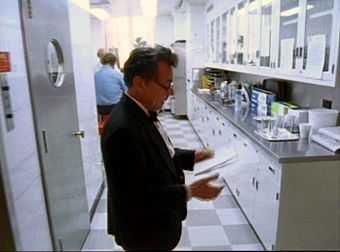
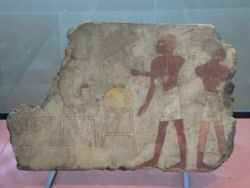

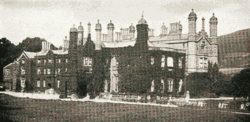
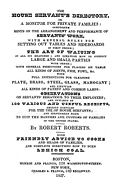


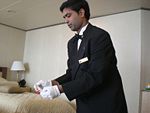

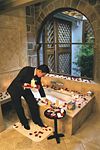

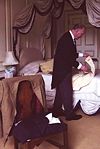
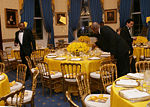
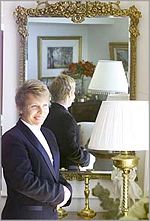
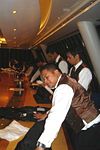
![Butler Rick Fink (left), who runs a private butler valet school in Winston Churchill's former weekend mansion, demonstrates to two students the correct procedures for packing a suitcase.[41]](/wiki/images/thumb/7/76/Rick_Fink_-_butler-valet_school_2.jpg/150px-Rick_Fink_-_butler-valet_school_2.jpg)

